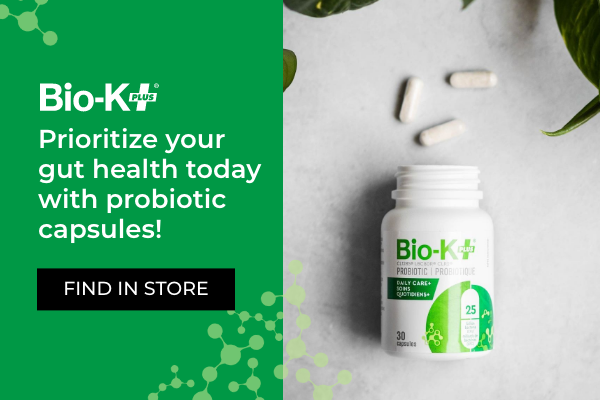The Link between Gut Health, Fatigue & Energy
Feeling tired or low in energy is common and something that all of us have felt the impact of. It’s easy to understand why you’re feeling tired when you’ve missed out on sleep, if you’re stressed out, or your eating habits are not giving you the fuel you need, but the truth is ongoing chronic fatigue symptoms are usually part of a much more complex issue.
In the short term, easy and obvious fixes like caffeine and sugar may seem to help make things better. But, in order to truly feel more energized, it’s important to understand the root of the issue and look at which systems in the body may be out of balance as well as learn about how chronic fatigue and gut health are related.
The Digestive System & Energy
Like so many other areas of our health, the gut has a huge impact on our overall wellbeing. This probably isn’t too surprising given that we know food = energy, and food is processed through the digestive system. Yet, there is more to the story! Unfortunately, when the gut microbiome is compromised, several issues that are directly linked to energy and chronic fatigue symptoms may arise.
Decreased Nutrient Absorption
We’ve been told our whole lives “you are what you eat” and while this is certainly true, and the food is our fuel, the food still needs to be absorbed and assimilated in order to power our bodies properly. A healthy gut microbiome with a healthy balance of good bacteria plays several roles in the energy equation. At the most basic level, if our gut health is compromised, it may lead to the inability to break down food properly. Thus, when the nutrients aren’t available for cellular energy production, you certainly won’t be feeling energized!
How does a healthy gut help improve nutrient absorption
On top of this, a healthy microbiome plays other roles in the metabolic-energy equation. Healthy gut microbiota help to create some of their own B-Vitamins which have specific roles in energy production. Healthy bacteria also communicate with the other cells in the body to help regulate blood sugar and thus, help to avoid fluctuating energy levels. What’s more, is that the healthy bacteria in the gut microbiome also help to create and regulate neurotransmitters (like serotonin and tryptophan), the chemicals in the brain and the body responsible for happiness, motivation, and sleep - all the things directly tied to feeling energized!
Given that we must support our gut microbiome for nutrient absorption for optimal energy, it’s imperative to ensure we’re getting enough gut supportive nutrients as well as natural probiotics within our diet! Fermented foods such as sauerkraut, kimchi, tempeh, kvass, natto, and pickles can be extremely helpful in helping to ensure healthy populations of beneficial bacteria in the digestive system.
It’s also helpful to consider taking a high-quality probiotic created with clinically-proven bacterial strains that is also research proven to be effective in humans. Incorporating probiotic supplements are especially important during times of high stress, poor diet or when taking medications or antibiotics.
Chronic Inflammation
Could gut dysbiosis be linked to chronic fatigue syndrome? High levels of inflammation in the body are also related to extreme fatigue through dysbiosis, (the result of a bacterial imbalance) which often results in a digestive condition known as the “Leaky Gut Syndrome.”
With “Leaky Gut,” the integrity of the intestinal lining is compromised which leads to unwanted toxins and undigested food particles entering the bloodstream. This sets alarm bells off in the immune system including the release of inflammatory molecules known as ‘cytokines.’ The syndrome presents different symptoms in different people, yet extreme fatigue and brain fog are very common. So, how to get rid of brain fog?
How to stop dysbiosis?
The good news is that reversing dysbiosis and working towards healing the integrity of the gut lining are entirely possible. Although the protocol is unique for every individual, it generally includes: reducing inflammatory foods (or those foods which may cause sensitivities such as processed food, refined sugar, gluten, lectins, conventional dairy, GMOs & FODMAPs), adding in healing nutrients from food such as bone broth, colorful plants, healthy fats and taking probiotic supplements (Vitamin D, Omega 3, Zinc, and L-Glutamine). The reinoculation of the beneficial bacteria (from food and a high quality probiotic) is also a priority in order to form a healthy line of defense against unwanted invaders, which ultimately keeps inflammation in check.
Disrupted Immunity
Another example of how an unhealthy gut flora impacts energy and fatigue levels is its role in immunity. With over 80% of the immune system being housed in the intestine, a healthy gut will lead to a healthy immune response. While we all know that when we’re faced with an illness we aren’t our most energetic or vibrant selves, there’s more to it than that.
How does a healthy gut help improve immunity?
A healthy intestinal lining is one where the vast and diverse gut bacteria create a film like a barrier along the inside wall. When the balance of good bacteria and bad bacteria is in a healthy ratio, the gut lining is protected and the beneficial bacteria will crowd out the disease-causing bad bacteria, helping to fight infections.
When considering the health of the immune system living inside your gut, many of the same simple ideas apply: eat healthy fruits, veggies and fermented foods in order to feed the good bacteria, take an effective multi-strain probiotic daily to replenish the bacteria in the gut microbiome, avoid over-sanitization and practice good stress management and sleep habits!
Do you have any other questions about gut health? Ask us in comments below. If you are looking to stock up on Bio-K+, head to our store locator. For more information on Bio-K+, probiotics and digestive health, contact us, find us on Facebook and Instagram or join our community.






